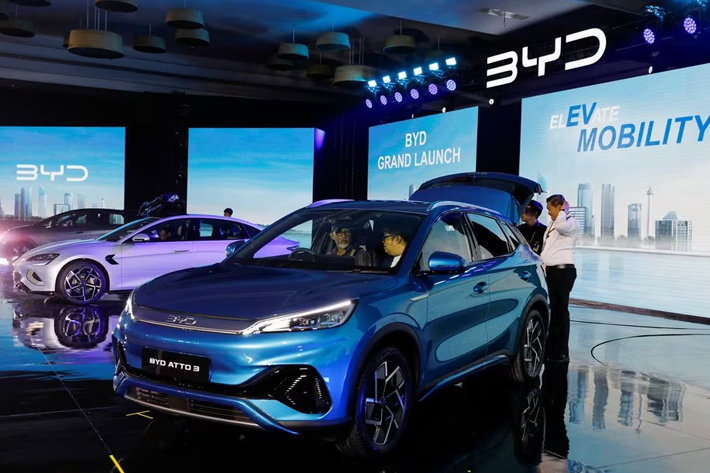The European Commission is expected to hike tariffs on Chinese electric vehicles next week – a move that could impose billions of dollars in new costs for Chinese carmakers.
But the provisional tariffs, tipped to be announced by June 5, are also likely to kick off a round of talks with Chinese executives that could soften the blow for the world’s biggest EV industry.
Analysts say both Europe and China have reasons for wanting to strike a deal.
ALSO SEE: Brazil Now Top Destination For Chinese EVs As Exports Explode
German carmakers want access, EV tie-ups
China’s EV industry needs profitable exports to the world’s third-largest economy to counter falling margins at home, while German automakers want access to China’s auto market and EV partnerships to drive costs down.
Every additional 10% in European Union tariffs on top of the existing 10% levy would cost China’s EV exporters about $1 billion based on 2023 trade data. That cost will grow this year as Chinese EV makers expand exports to Europe.
Past EU subsidy investigations on imports from China of other products have resulted in extra duties ranging from about 9% to 26% for companies cooperating with the investigation. Analysts see EV tariffs broadly in that range. The duties would be imposed from early July but could apply retroactively for the three prior months.
China has signalled it is readying alternatives for the bargaining ahead. The EU provisional duties could be challenged, or even dropped if a large enough share of EU governments oppose them after four months.
The China Chamber of Commerce to the EU, a trade group, said last week Beijing was considering hiking tariffs on large-engine car imports to 25%.
China has also floated the idea of lowering tariffs on EU auto imports to 10% from 15%, two people with knowledge of the matter said.
The European Commission has warned BYD, SAIC and Geely they did not provide enough information in response to its investigation of subsidies. That could clear the way for higher tariffs on those companies, a reference that will be used to set levies for the rest of the industry in China.
China ‘using carrots and sticks’
The Chinese trade group said the EU investigation was flawed from the start and had demanded information Chinese automakers could not provide. That included details on suppliers, including CATL, who were not part of the probe, one person with knowledge of the investigation said. CATL did not immediately respond to a request for comment.
In a statement, the group said there could be an opening to negotiate. “The ball may be on the European side,” it said.
Analysts expect both sides to look for a deal.
“I expect the Chinese side to, and we’re already seeing this, use a combination of carrots and sticks to convince some key member states to push back against the Commission,” Noah Barkin, a Rhodium Group senior adviser, said.
The European decision would come after the United States quadrupled tariffs on Chinese EVs to 100% – a move Tesla’s Elon Musk denounced after previously warning Chinese automakers were on track to “demolish most other car companies”. Tesla, the largest EV exporter from China, also faces the threat of higher EU tariffs.
European market the most important
European automakers have teamed with newer Chinese carmakers to bring EVs to market more cheaply and quickly. Volkswagen and BMW in April pledged more than $5 billion to expand research and production in China. In 2023, almost 29% of cars made by German automakers were sold in China, trade data shows.
Europe is the most important overseas market for Chinese EV makers. With cut-throat competition squeezing margins in China, EV makers such as BYD can sell cars in Europe for more than twice the China price. That leaves some room to absorb additional tariffs, analysts say.
Chinese EV makers and suppliers are also investing in Europe. Xpeng entered the French market this month. At the opening of Nio’s Amsterdam showroom last week, founder William Li said the Chinese EV maker would forge ahead in Europe.
BYD is building an EV plant in Hungary and eyeing a second European plant. Chery Auto, China’s largest automaker by export volume, is partnering with Spain’s EV Motors to open its first European plant in Catalonia. State-owned SAIC, China’s second-largest auto exporter, is searching for its first Europe plant.
CATL, the world’s largest battery maker, has ramped up production in Europe. Other Chinese battery suppliers are helping France build its “battery valley”.
German Chancellor Olaf Scholz said during his visit to China in April that it would be better for Europeans to press China on lowering its auto import tariffs than to start a trade dispute.
Accompanying Scholz on his China trip were the CEOs of Mercedes-Benz and BMW, both of whom spoke against trade barriers and argued German automakers can handle Chinese competition.
A joint venture between Stellantis and Leapmotor – through which the Franco-Italian automaker will sell the Chinese EV maker’s cars abroad – shows how established automakers can pivot on whether China represents a threat or an opportunity.
Stellantis CEO Carlos Tavares, who previously called for higher tariffs on Chinese EVs before partnering with Leapmotor, said this month that tariffs were “a major trap”.
“We will try to be Chinese ourselves,” Tavares said in Munich. “Instead of being purely defensive vis-à-vis the Chinese offensive, we want to be part of the Chinese offensive.”
- Reuters with additional editing by Jim Pollard
ALSO SEE:
Higher China Tariffs Will Start on August 1, US Trade Rep Says
Stellantis CEO Calls China EV Tariffs a ‘Trap’. He May Be Right
US, EU Must Act Jointly on China’s Industrial Overcapacity: Yellen
Chinese Firms Seen Shifting Production Abroad to Avoid US Tariffs
Biden Ramps US Tariffs on Chinese EVs, Metals, PV Cells, Chips
Trade War Heating Up: China Hits Back After Biden Boosts Tariffs
China Slams ‘Biased’ EU Over Electric Vehicle Imports Probe
EU Says China EVs Funded by Subsidies, Plans Retroactive Tariffs























